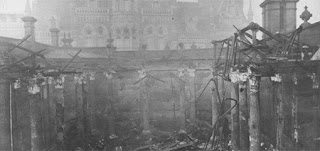University of Delaware/Delaware Art Museum
2012 Fellowship in Pre-Raphaelite Studies
The University of Delaware Library, in Newark, Delaware, and the Delaware Art Museum are pleased to offer a joint Fellowship in Pre-Raphaelite studies. This short-term, one-month Fellowship, awarded annually, is intended for scholars conducting significant research in the lives and works of the Pre-Raphaelites and their friends, associates, and followers. Research of a wider scope, which considers the Pre-Raphaelite movement and related topics in relation to Victorian art and literature, and cultural or social history, will also be considered. Projects which provide new information or interpretation--dealing with unrecognized figures, women writers and artists, print culture, iconography, illustration, catalogues of artists' works, or studies of specific objects--are particularly encouraged, as are those which take into account transatlantic relations between Britain and the United States.
Receiving the Fellowship
The recipient will be expected to be in residence and to make use of the resources of both the Delaware Art Museum and the University of Delaware Library. The recipient may also take advantage of these institutions' proximity to other collections, such as the Winterthur Museum and Library, the Philadelphia Museum of Art, the Princeton University Library, and the Bryn Mawr College Library. Each recipient is expected to participate in an informal colloquium on the subject of his or her research during the course of Fellowship residence.
Up to $3,000 is available for the one-month Fellowship. Housing may be provided. Personal transportation is recommended (but not mandatory) in order to fully utilize the resources of both institutions.
The Fellowship is intended for those who hold a Ph.D. or can demonstrate equivalent professional or academic experience. Applications from independent scholars and museum professionals are welcome. By arrangement with the Yale Center for British Art, New Haven, CT, scholars may apply to each institution for awards in the same year; every effort will be made to offer consecutive dates.
Important Dates
The deadline to apply for the 2012 Fellowship is October 15, 2011. Notification of the successful applicant will be announced by November 15, 2011. The chosen candidate will then be asked to provide a date for assuming the Fellowship by December 1, 2011.
About the Delaware Art Museum
Founded in 1912, the Delaware Art Museum is home to the largest and most important collection of British Pre-Raphaelite art in the United States. Assembled largely by the Wilmington industrialist, Samuel Bancroft, Jr., at the turn of the century (with significant subsequent additions), the collection includes paintings and drawings by all the major and minor Pre-Raphaelite artists, as well as decorative arts, prints, photographs, manuscripts, and rare books. The Helen Farr Sloan Library & Archives, with a reference collection of 30,000 volumes, holds Samuel Bancroft’s papers and correspondence, a rich source for the history of collecting and provenance which also contains significant manuscript material by and about the Rossettis.
About the University of Delaware Library
The University of Delaware Library has broadly based and comprehensive collections—books, periodicals, electronic resources, microforms, government publications, databases, maps, manuscripts, media, and access to information via the Internet—which provide a major academic resource for the study of literature and art. Many printed and manuscript items related to the Pre-Raphaelites and their associates are in the Special Collections Department, including major archives relating to the Victorian artist and writer, George Adolphus Storey, and to the bibliographer and forger, Thomas J. Wise. The Mark Samuels Lasner Collection, associated with the Special Collections Department, focuses on British literature and art of the period 1850 to 1900, with an emphasis on the Pre-Raphaelites and on the writers and illustrators of the 1890s. Its rich holdings comprise 7,500 first and other editions (including many signed and association copies), manuscripts, letters, works on paper (including drawings by Edward Burne-Jones and Dante Gabriel Rossetti), and ephemera.
To Apply
To apply, send a completed application form, together with a description of your research proposal (maximum 1 page) and a curriculum vitae or resume (maximum 2 pages) to the address given below. These materials may also be sent via email to: fellowships@delart.org. Letters of support from two scholars or other professionals familiar with you and your work are also required. These must be sent by mail to:
Pre-Raphaelite Fellowship Committee
Delaware Art Museum
2301 Kentmere Parkway
Wilmington, DE 19806
For an application form and more information go to:
www.delart.org/education/fellowships.html












